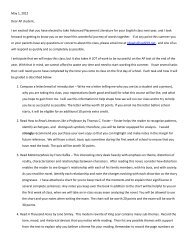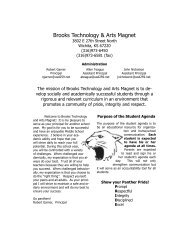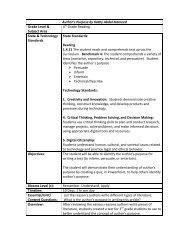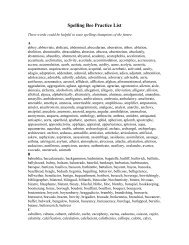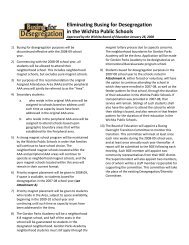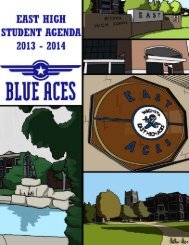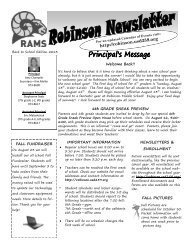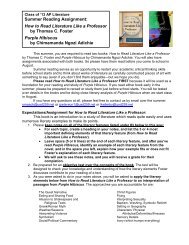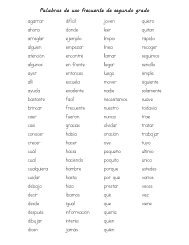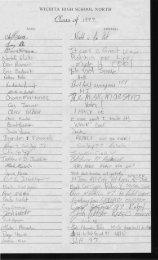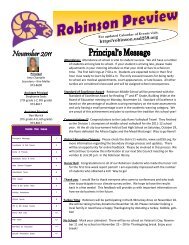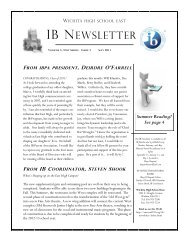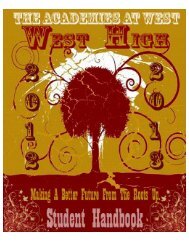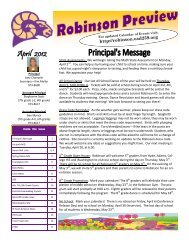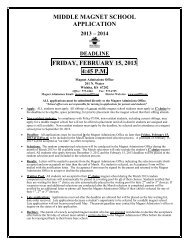IB NEWSLETTER - East High School - International Baccalaureate ...
IB NEWSLETTER - East High School - International Baccalaureate ...
IB NEWSLETTER - East High School - International Baccalaureate ...
Create successful ePaper yourself
Turn your PDF publications into a flip-book with our unique Google optimized e-Paper software.
WICHITA HIGH SCHOOL EAST<strong>IB</strong> <strong>NEWSLETTER</strong>VOLUME 3, NEW SERIES ISSUE 2WINTER 2011FROM <strong>IB</strong>PA PRESIDENT, DEIRDRE O’FARRELLWHO MOVED MY CHEESE?How do you and your <strong>IB</strong> student deal with change? Parents of seniors see tremendouschange looming as the final weeks of spring semester wind their way towards theculmination of four years of high school in May. Parents of juniors sense the ticking ofthe graduation clock as they make plans for campus visits, and their student begins toreceive more daily ‗snail mail‘ than they do. Parents of current sophomores and freshman,however, find themselves faced with an unforeseen challenge of a different sort.Recent mandates made by the <strong>IB</strong>O governing body in Geneva and passage of newgraduation requirements by the Board of Education will necessitate changes to theirstudent‘s Four Year Plan. Details of how these changes impact students‘ Four YearPlan are in the process of being shared with 9 th and 10 th grade students by our ―MasterScheduler,‖ Mr. Gallagher. It will be up to us as supportive parents to help our studentnavigate the changes ahead and come out on the other side…to find the cheese, atlast!I would like to encourage all of you to volunteer when the call/email goes out for helpwith the <strong>IB</strong> Senior Recognition event, May 15 th . It will take all of us working togetherto make the celebration of our Class of 2011 successful. On behalf of the <strong>IB</strong>PA board Iwould also like to thank all of you who have already contributed to the <strong>IB</strong> Parent Association.If you have not yet mailed in a contribution for the 2010-11 school year,please consider doing so. (See page 2) Together, we can make a significant impact bydirectly funding teacher requests for classroom resources and by helping to pay <strong>IB</strong> testfees for families in need of assistance, and much more. As always, I welcome yourparticipation in <strong>IB</strong>PA.FROM <strong>IB</strong> COORDINATOR, STEVEN SHOOKWHY AREN’T YOU IN SCHOOL?Parents new to the whole <strong>IB</strong>-exam thing might find themselves asking this question oftheir son or daughter this coming May. You might enter your kitchen to find your child,along with half a dozen of their friends hanging out, at 10 AM, on a school day. Whenasked why they aren‘t in school, they reply, ―We don‘t have to attend classes today becausewe have tests tomorrow.‖Before you jump to the conclusion that this is some traditional <strong>East</strong> <strong>IB</strong> wool being drawnover your eyes, let me clarify.continued on page 7Pleasejoin us in around ofapplausefor LauraKilgourwho hasserved onthe <strong>IB</strong> Parent AssociationBoard for the past four andhalf years. With the increasingdemand for her serviceas a substitute teacher inUSD 259, Laura has resignedher <strong>IB</strong>PA post.Mandy Jordan has ablystepped up to the plate.Thank you, Laura!Welcome Mandy!The <strong>IB</strong> Newsletter is available to all<strong>IB</strong> families and is published everyOctober, February, and May.Material should be addressed on orbeforeSeptember 15, January 15, andMay 5 by email toMary Shepard,shepardsteiner@aol.com<strong>IB</strong> <strong>NEWSLETTER</strong> EDITORIALBOARDMary B Shepard, EditorDeirdre O‟Farrell, <strong>IB</strong>PA PresidentSteven Shook, <strong>IB</strong> CoordinatorWichita <strong>High</strong> <strong>School</strong> <strong>East</strong>2301 E. Douglas AvenueWichita, KS 67211Tel: 316-973-7200Fax: 316-973-7224Find us on the Web!http://east.usd259.org/ib/newsletter/index.html
PAGE 2<strong>IB</strong> <strong>NEWSLETTER</strong>FOLLOW THE MONEYThe <strong>IB</strong> Parent Association exists to promote the interests of the students enrolled in the <strong>IB</strong> Diploma Programme at<strong>East</strong> <strong>High</strong> <strong>School</strong> by remaining informed about <strong>IB</strong> Programme goals, objectives, and activities. To that end, wework to secure financial support to benefit the students, faculty, and staff in the <strong>International</strong> <strong>Baccalaureate</strong> Programme.So far in the 2010-11 academic year, the <strong>IB</strong> Parent Association has funded:Assistance with <strong>IB</strong> testing feesContribution towards the <strong>East</strong> <strong>High</strong> Orchestra‘s trip to the Midwest Clinic in Chicago, December 2010Contribution towards technology equipment for Music HL & SL classesProfessional storyteller, through Arts PartnersWatermark gift cards for new <strong>East</strong> <strong>High</strong> TeachersBig Do Rat RaceChemistry supplies for the annual integrated-science project required for <strong>IB</strong> Diploma candidatesSupplementary materials for <strong>IB</strong> PsychologyPizza lunches for <strong>IB</strong> academic discussion groupsFaculty and Staff Appreciation LuncheonTeacher holiday and retirement giftsSenior RecognitionProject GraduationCLIP & MAIL CONTR<strong>IB</strong>UTION FORM<strong>IB</strong> PARENT ASSOCIATIONNAME_____________________________________________________________(Preferred Listing)ADDRESS_________________________________________________________ _TELEPHONE___________________________EMAIL________________________CHILD‘S NAME & GRADE__________________________________________Method of Payment: (circle one) Cash/Check (Payable to <strong>IB</strong>PA)/VISA/MastercardName as it appears on card______________________________________________Card #_____________________________________________Exp. Date________Signature___________________________________________________________ I/my spouse/partner work(s) for a company that matches charitable contributions. I have enclosedthe requisite forms here, together with my donation.Mail to: <strong>IB</strong> Parent Association, c/o <strong>IB</strong> Office, <strong>East</strong> <strong>High</strong> <strong>School</strong>; 2301 E. Douglas; Wichita, KS 67211
NEW SERIES VOLUME 3, ISSUE 2Thank you for giving to the ibpa fundPAGE 3Dana and Les AabyChristy and Brent AndersonChong and Andrew AuerbachAlisha BondMarlene and D.W. BosterRuth and Thomas BradshawCynthia and Bud BryantJane and Joseph CamenzindGina and Kevin CrabtreeTina Dahl and Terry WatsonClaire and Ken DannenbergTammy and David DoyelSanthi Govindarajan and GovindarajanBalasubramonyLois and Tom HarderDee Anne HerronNancy and Steve HwangLisa and David JamisMandy and Jeff JordanPeggy Kehr and Kim DumfordShawna and David KingreyKrishna Krishnan and Shreeja KumarLatham & Watkins LLPBrenda and Tim LawtonNancy and Rick LeComptePaula and Jeff LivingstonDonna and Jim LoganDee and Steve MarshJohanna and Greg MittmanDawna and Doug O‘ConnorDeirdre O'Farrell and Keith PickusDoreen and John PapadatosPatricia and Lory PostoakRobin and Brian PressnallBetsy and Scott RedlerBarbara and Glyn RimmingtonMichelle and Michael RoeschTameka ScheopnerPeggy and Mark SchneegurtJulie and Shawn SchraderRong Shao and Zhiren JinKay and Tim ShaverMary Shepard and Charles SteinerLori and Macen ShinsatoSuparna and Ragu TirukondaRenee and Jeff TownsendChristine and Jay VoncannonJane and Michael WalkerNancy and Cal WiebeThanh Vu and Dieuhien NguyenFaculty and staff Appreciation LuncheonOne of the great <strong>IB</strong>PA traditions is to sponsor a luncheon in appreciation of all <strong>East</strong> <strong>High</strong> Faculty and Staff.On October 14, 2010, nearly 200 faculty and staff enjoyed both a Mexican Fiesta with delicious food provided byAbuelos and a host of scrumptious desserts cooked by <strong>IB</strong> parents. Kudos go to Luncheon Chair, Mary Wheeler, andher able assistant, Betsy Redler, for organizing the festivities. Thanks are also due the many bakers, treat-makers,and event volunteers who made this year‘s lunch such an outstanding success, including:Dana AabyRukhsana AhmedDeb AntonLisa BahnerElisa BalderasBohner FamilyJane and Joe CamenzindGina CrabtreeDana DabyShipra DeoriTammy DoyelShanthi GovindarajanCarrie HeimanAmy HutflesNancy HwangLisa JamisMandy JordanLaura KilgourShawna KingreyLinda KnightlyDiane KristekShreeja KumarBrenda and Tim LawtonNancy LeCompteDonna LoganGlenna LoweBlair McGeheeFern McGeheeDenis McIntireKeely McNeelyKathy MaherAmy MenasKeith NorrisDeirdre O'FarrellDoreen PapadatosBhavalthi RamanaJodi RiceAaron SantryTameka ScheopnerMary ShepardLori ShinsatoVicki ShookLaurie SmithSue TirukondaKatie ToddJay VoncannonCal WiebeElizabethWilkesSandra Williams
PAGE 4<strong>IB</strong> <strong>NEWSLETTER</strong>Journey to college: Q&A with Mr. Gallagher and Ms. FryBeginning the Conversation about CollegeWhat's the best way to encourage my son/daughter to talk to me about their college interests?It might sound oversimplified, but simply asking students about their hopes and dreams often elicit the most direct response. Students often describe pressureand/or control in regard to parental expectations (whether real or perceived). Supportively prompting thoughts/questions about college can be a great wayto start a dialogue in which adolescents feel safe to answer — the key is to ask an open-ended question and then just listen.Beginning with general terms and goals can be a great way to get this started, which might sound something like, "Do you think you would be happier in alarger school or smaller school? Liberal arts college or university? Urban or rural? Are there any schools you would like to visit?” It probably goes withoutsaying, but we caution against presenting a rapid-fire or pressured pace when asking questions. This might be the first time your son or daughter has seriouslyconsidered some of these factors, and the greatest benefit can generally be found in providing a safe and encouraging context in which they can behonest. Visits to nearby schools which vary in size can be helpful in facilitating this discussion.It is also important that the student be given the responsibility for “driving” the process. We like to paint a scene like this: think of the college applicationprocess as a journey whereby the student is driving the “car” and is responsible for steering the route. Parents and advisers are in the back seat, whisperingmessages to go, stop, or speed up, as necessary. Throughout the entire endeavor, the student‟s self-advocacy is of supreme importance.With thousands of colleges across the country to choose from, how can students narrow down the options andfind a handful that might be a “good fit?”<strong>High</strong>er education can achieve many goals and is certainly life-changing for most students, but the bottom line often comes down to whether a school offers aparticular major or is strong in preparing students for their intended career path. Once students have determined that a school provides a quality program inthe area of study that matches their gifts and interests, they can begin filtering other factors, such as urban/rural, large campus/small campus, politicalleanings, etc. It is likely that there are several schools that a student could describe as the perfect fit, but this perception might be most effectively confirmedwith a campus visit.Most schools will tell you that they do not track campus visits, but that has little impact on their real value. When surveyed about the value of visits, the<strong>East</strong> <strong>IB</strong> class of 2010 overwhelmingly recommended visits to at least the top one or two schools on a student's list. Each year, graduates share revelatorystories from campus visits, sometimes discovering that their "dream school" is not the right place for them or that the school they previously discounted providesmore than they ever imagined. The question of "when to visit" is best answered by each family's unique situation, such as how well they already knowthe schools to which they are applying, the financial and scheduling factors and different times of year, and the timing of admission decisions (rolling admissionsin the fall or selective admissions in the spring). Several graduates suggested visiting a campus while classes are in session to gain a more authenticimpression of campus life. Also, for example, it is important to challenge the student‟s previously held beliefs about size of campus. If a student appearsconvinced that he/ she would only be at home on a huge campus, it is important to visit a medium sized and small campus to confirm that fact. Often,what students THINK they are interested in is quite different from what really best suits them. Experience really is the best teacher.Besides the public universities in Kansas, what are the five most-frequently attended schools for <strong>East</strong> <strong>High</strong> <strong>IB</strong>students over the past ten years?For the last few years over half of <strong>East</strong> <strong>IB</strong> graduates have chosen to attend colleges and universities in Kansas. From 2003 to 2010, the following privateand/or out-of state schools have been the most-frequently attended by <strong>East</strong> <strong>IB</strong> graduates: University of Tulsa (36), University of Nebraska-Lincoln (18),Boston University, and Harvard University (8), Johns Hopkins University, University of Michigan, and Northwestern University (7), Air Force Academy,Cornell University, Friends University, Massachusetts Institute of Technology, and University of Missouri-Kansas City (5).Getting Serious about the College SearchHow important are extracurricular activities to the admissions process to major universities and colleges for <strong>IB</strong>students? If my child is not that active outside of the classroom, is it too late?While the role of activities is certainly important in each student's application, it is difficult to gauge what impact this factor actually has on selection. Weare told by admissions representatives that demonstrated academic ability is still the bottom line. Rarely could it be described as too late for a student todiscover or pursue a new interest or area of study, but colleges are continually searching for the authentic student behind the application, which they will tellyou motivates many of their requests for essays and letters of recommendation. If a student has not demonstrated any interest in clubs, extracurricular orcommunity activities, colleges are likely to wonder why or draw their own conclusions about the student's interests and abilities. <strong>East</strong> <strong>IB</strong> students are able tolist a variety of activities simply because of CAS requirements. So while we encourage involvement in activities, it is also important to help students becomemore confident in their own natural gifts and interests, which can be perceived as its own strength in the interview process.Other than tuition, what are the top five things that should be considered when reviewing a college?Major; size of campus; location/geography; types of people/social context/culture
NEW SERIES VOLUME 3, ISSUE 2PAGE 5When should the student (and parents) start the search for scholarships?Starting junior year, become familiar with scholarships listed on the <strong>East</strong> <strong>High</strong> Web site and Web sites such as Fastweb and College Board as well as local, lesscompetitivescholarships; students are generally eligible to begin applying for scholarships after their junior year, depending on the scholarship (opportunitiesvary from year to year).With the increasing deficit problems that many states are facing, should <strong>IB</strong> students expect a decrease in the amountof scholarships offered?Education headlines over the past two years have listed budget cuts, staff reductions, and program eliminations. <strong>School</strong>s with large endowments could conceivablymaintain the same level of financial aid support they have demonstrated in the past, but it is certainly reasonable to expect that the minimal scholarshippackages offered to most students could be further diminished, particularly at schools that allow in state funding. One advantage <strong>IB</strong> students might have in thistype of scenario can be found in the potential for transfer credits in competitive scholarships that are based on the student's ability speak or write.Is there an expectation that the <strong>IB</strong> Counselor (or others) will talk to students about their career choice and help themidentify what colleges to consider? Will there be an educational session for juniors on making college applications?Yes. Students begin purposeful career planning in the fall of their sophomore year, and will receive direct college search and application instruction during Aprilof their junior year. This will include procedures about applications, interviews, etc. Much of this information is provided and classroom presentations, butstudents are often most engaged, and thereby more likely to remember and use information, when a discussion is relevant to their current thoughts and questions.More specific direction and review of previously presented material is provided to students and parents on a case by case basis (students need to ask questions).Students will also receive extensive direction in organizing and strategically approaching the college application process, including guidelines regarding organizationand timelines, but this gets the most traction when a student becomes actively engaged in the process. <strong>IB</strong> juniors will also be asked to read and discussHow to be Irresistible to Colleges (Dawson and Herring) in their English classes in May. They will also write a resume and a college essay in preparationfor the college application process.Will there be tips to increase a student’s chance for acceptance? If my child is wait-listed for admission, what are thechances they could be admitted?The instruction described above centers on helping students present themselves in the most positive light. The only predictability students and parents can hope tofind in competitive admissions scenarios can be found in statistical data provided by each school, such as average test scores, GPA, etc. for admitted students.The impossible question to answer sounds something like "How can I increase my odds for admission to a specific university with a 7% acceptance rate?” Fromall that has been written about the seemingly mysterious process of college admissions, decisions are most often based on each college‟s demographic needs in theirprocess of "building a class.” This covers a myriad of factors, but always begins with academics. The impact of demographics applies even more to the questionabout a student‟s wait-listed status. Most schools will not encourage students to put hope in moving off of a college‟s waitlist because waitlists exist for the purposeof completing the freshman class. It may sound cliché, but one of the most important strategies in presenting a competitive application is simply performingwell in class.Applying to CollegeWhen should my child begin the application process? When is the latest they can apply?Some schools offer rolling admissions, up until the summer preceding college while other schools require an early application deadline of November 1. However,there is little to no benefit in waiting to apply as all schools begin the admission process as well as the assignment of scholarship dollars. Each school outlines itsown deadlines which students and parents must track closely, but we encourage all applications to be completed by November 1 of senior year.How important are interviews in the college admissions process?While few schools require interviews, many selective schools recommend them (often conducted by alumni) as a way for both schools and students to gain morecontext when considering the question of “fit.” Any additional opportunity to make a personal contact is important.What's the average number of colleges that an <strong>IB</strong> student typically applies to?Most students apply to an average of six colleges, which seems appropriate, and are urged to diversify the risk in their applications, ranging from „safety‟ schools,where admission is guaranteed, to „reach‟ schools that present a greater risk with admission rates below 30 per cent.Will students who complete the <strong>IB</strong> Program enter college as freshmen or higher?Students attending state universities reported an average of 24 credits awarded for their <strong>IB</strong> work, which gave many of them sophomore (and sometimes junior)status in their first year of college. The ability to complete college in three years or pursue double majors is a distinct advantage that is often overlooked.See page 7 for more information and an important college-search announcement.
PAGE 6THINKING ABOUT CAS<strong>IB</strong> <strong>NEWSLETTER</strong>By Linda WhiteJuniors and seniors report their CAS activities on the school Fusion page. Occasional problems have occurred with Fusion, so analternative submission route is to email Ms. White at lwhite1@usd259.net. Students are to describe their project, choose up tothree outcomes, and describe, in full, how their project specifically meets those outcomes. Before submitting a project, studentsshould review the expectations of a CAS project as well as what outcomes can be reasonably addressed by that project.The fuller the description, the more likely its acceptance. For example, the first submission about a book club activity (below)was not initially accepted, while the second report was. The first report discusses how the students worked collaboratively, butnot how the activity met the requirements of a CAS activity; the second one specifically addresses the ethical implications ofthe activity and why the book was chosen for study.1. ―After each section (of the book) we met and made a study guide that consisted of themes, characters, symbols, and motifsfor each chapter of section. By creating this study guide we had to work together and we had to find days to discuss thenovel. If we did not work well we would not have been able to produce a study guide or understand the moral of the novel.‖2. ―Reading and discussing the book got us talking and me thinking outside of Kansas. Previously, I hadn‘t really consideredwhat was happening in the Middle <strong>East</strong> as terribly relevant to my daily life and I couldn‘t really visualize life anywhere but herein the U.S. Reading opened my eyes to the customs and traditions and triggered several arguments in our groups about the importanceof education. The book club was also beneficial because we did not blindly accept everything (the author) said in thebook. At times we questioned why he acted a certain way and how he could feel such dedication. Discussing the book also madeus consider how fortunate we were to be able to expect an education to be given to us.‖It is also important for students, either in their junior or senior year, to plan an activity in which they take a leadership role.They should then recruit others to help with the project. Students should also be looking for a long-term commitment that theycan make to show perseverance and commitment (not a one-time activity).<strong>IB</strong> PA BOARD OF DIRECTORS 2010-2011Deirdre O‘Farrell, President deedaann@cox.net 618-8805Jay Voncannon, VP/President-Elect Jay.voncannon@kochind.com 828-5291Mandy Jordan, Secretary mandyj@cox.net 684-6044Nancy LeCompte, Treasurer nancylou@cox.net 685-8985Will Klunder, Senior Representative will.klunder@wichita.edu 684-7842Cal Wiebe, Junior Representative cwiebe@wiebelaw.com 265-6300Nancy Hwang, Sophomore Representative nancywhwang@yahoo.com 636-8959Aaron Santry, Freshman Representative aaron.santry@ang.af.mil 269-5345Brent Anderson, At-Large brentcristy@gmail.com 821-9913Tammy Doyel, At-Large tdoyel@cox.net 631-3960Dee Marsh, At-Large dfmarsh54@gmail.com 641-3301Elizabeth Wilkes, At-Large elizabeth.a.wilkes@gmail.com 686-2054Betsy Redler, Past President betsred@cox.net 634-1110Steven Shook, <strong>IB</strong> Coordinator (Ex Officio) sshook@usd259.net 973-7289Mary B. Shepard, Newsletter Editor shepardsteiner@aol.com 612-7253Mary Wheeler, Faculty Luncheon Chair msmwheels@yahoo.com 685-1728
NEW SERIES VOLUME 3, ISSUE 2PAGE 7<strong>IB</strong> @ <strong>East</strong>Ken Thiessen, PrincipalSteven Shook, <strong>IB</strong> CoordinatorMatt Gallagher, <strong>IB</strong> CounselorJennifer Fry, College AdvisorCeleste Hutton, 9 th & 10 thgrade CAS AdvisorLinda White, 11 th & 12 th gradeCAS AdvisorTina Peterson, <strong>IB</strong> Secretary<strong>IB</strong> Office: 973-7289Web site: http:/east.usd259.org/Do youspeak <strong>IB</strong>?<strong>IB</strong>: <strong>International</strong><strong>Baccalaureate</strong>CAS: Creativity; Action;ServiceEE: Extended EssayTOK: Theory of KnowledgeSL: Standard LevelHL: <strong>High</strong>er LevelIA: Internal AssessmentEA: External AssessmentIOC: Individual OralCommentaryIOP: Individual OralPresentationP<strong>IB</strong>: Pre-<strong>IB</strong> coursesDP: Diploma ProgramAPUSH: AdvancedPlacement U.S. HistoryFrom Steve Shook, continued from p. 1Why Aren’t You in <strong>School</strong>?During the weeks that encompass <strong>IB</strong> Exams (May 3–21, 2011), <strong>East</strong> <strong>High</strong> has adopted afew provisions on behalf of the juniors and seniors who are taking exams. On any day astudent is scheduled for an <strong>IB</strong> exam, they are excused from classes for the entire day. Iftheir exam occurs on Tuesday–Friday, they are excused from classes the day before aswell. Please note: this does not include exams on Monday. Mr. Gallagher will visitclasses a week or two prior to the exam and remind students of several critical <strong>IB</strong> examrequirements. In addition, he will emphasize prompt arrival at least 15 minutes beforethe scheduled exam.The 2011 <strong>IB</strong> Exam Schedule is posted on the <strong>IB</strong> Web site. Also posted is the APExam schedule. The AP and <strong>IB</strong> exam schedules are developed independently andconflicts occur from time to time. In those instances, the <strong>IB</strong> exam ALWAYS takesprecedence; students must contact Kim Voth (SSC) to select an alternate AP examdate/time.The <strong>East</strong> <strong>High</strong> <strong>IB</strong> Parent Newsletter has been generously funded by the Wiebe LawOffice, PA., a general civil practice focused on business, financial and tax matters,including wills & trusts, and real estate. 151 S. Whittier, Suite 1100, Wichita, Kansas67207 (316) 265-6300; www.wiebelaw.com; cwiebe@wiebelaw.com.College Planning Night for <strong>IB</strong> parents of current 9 th , 10 th , and 11 thgraders: Tuesday, April 26 at 6:30 PM in the <strong>East</strong> <strong>High</strong> Library, followedby an optional financial aid planning session, from 7:30-8:30PM, sponsored and presented by Financial Benefits, Inc. Themajority of proceeds from the $30 fee go to the <strong>IB</strong>PA.Interested in books to help in the college search process? Check out past issuesof the <strong>IB</strong> Parent Newsletter (http:/east.usd259.org/ib/). Mr. Gallagher andMs. Fry also recommend:Colleges That Change Lives (Pope)The Princeton Review‟s The Best 361 CollegesThe Gatekeepers (Sternberg) for a more detailed look at the selectiveschool selection processFor Financial Aid, consult the following Web sites: www.finaid.org/calculators,www.fafsa.ed.gov, www.pin.ed.gov, profileonline.collegeboard.com/prf/index.jsp,www.fastweb.com, www.scholarships.com, www.questbridge.org, east.usd259.org/ssc/scholarships/results_page.asp
<strong>IB</strong> Parent Associationc/o <strong>IB</strong> Office, <strong>East</strong> <strong>High</strong> <strong>School</strong>2301 E. DouglasWichita, Kansas 67211<strong>IB</strong> DATEBOOK 2011TOK/CAS/EE Parent Information Meeting: April 5 in the LibraryFreshman CAS folders due to Ms. Hutton: April 14Senior CAS documentation due ONLINE: April 15Sophomore CAS folders due to Ms. Hutton: April 21Junior CAS documentation due ONLINE: May 20College Planning Meeting for Parents: April 26 (6:30 PM) in the Library followed by an optional FinancialAid planning session, from 7:30-8:30 PM, sponsored and presented by Financial Benefits, Inc. The majorityof proceeds from the $30 fee go to the <strong>IB</strong>PA.<strong>IB</strong> exams: May 3–21Extended Essay ―Prospectus‖ due for Juniors: May 16<strong>IB</strong> Senior Recognition in the New <strong>East</strong> <strong>High</strong> Auditorium: May 15Graduation, Koch Arena: May 18



